How Emory’s Sustainable Business Group is Partnering with Delta Air Lines and Leading the Way in Student Consulting
At the intersection of business innovation and environmental responsibility, Emory University’s Sustainable Business Group (SBG) is carving out a space for students passionate about using business as a tool for change. Founded to provide hands-on consulting experience for undergraduates focused on sustainability, SBG has quickly made its mark through impactful projects, industry partnerships, and student-driven leadership. Most recently, the group worked with Delta Air Lines to tackle one of the aviation industry’s toughest challenges: engaging customers in more sustainable travel practices.
In this Q&A, SBG Co-President Niels Cohen shares how the partnership with Delta came to life, how students are leveraging sustainability to stand out in competitive recruiting environments, and what’s next as the group expands beyond Emory. From pitching Fortune 500 companies to creating real-world impact—and even landing internships—this group of changemakers is proving that business can be both profitable and purposeful.
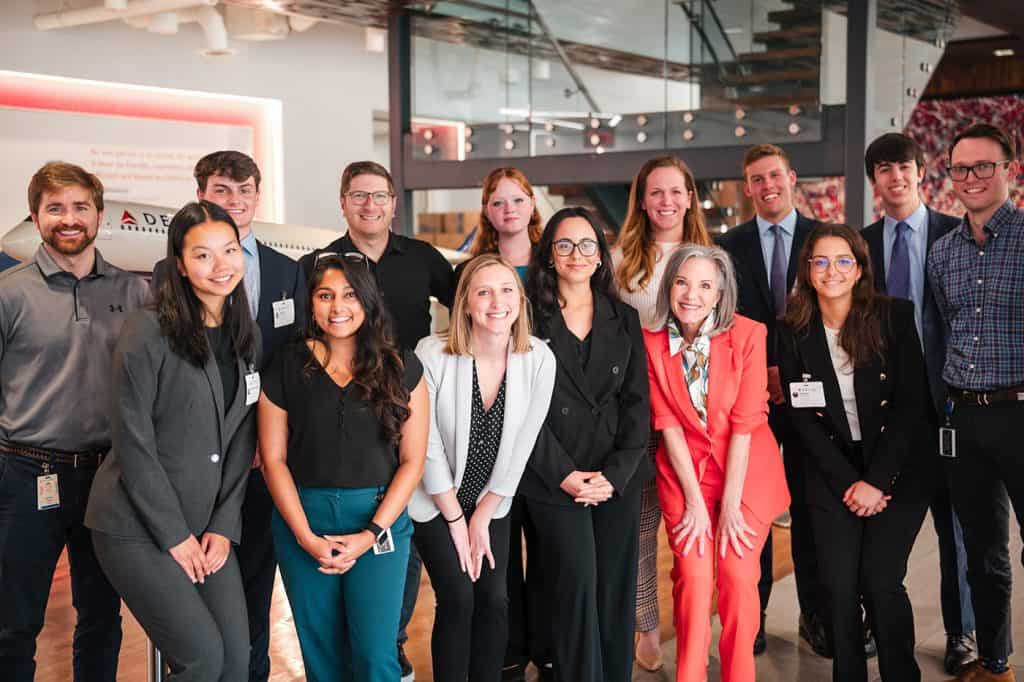
Tell us about the Sustainable Business Group. What is the mission behind it, and who is involved?
Emory Sustainable Business Group (SBG) is a student-run consulting organization focused on sustainability, operating through two main branches: consulting and education. SBG provides pro-bono consulting services to both sustainability-focused companies and organizations seeking to integrate sustainable practices into their operations. Through these projects, students gain practical experience solving real-world business problems, while companies receive fresh ideas, free support, and exposure to some of Emory’s brightest students.
For education, we host guest speakers who are doing impactful work at the intersection of business and sustainability, complemented by career development workshops focused on public speaking, resume building, consulting prep, and more.
Our club is headed by Co-President Brayden Kranz and me, and we are supported by our executive board: Inesha Gupta, Aarush Khanna, Riley Schwimmer, Ozan Demiroglu, Rushill Khanna, Tamryn Weiss, Riana Verma, Tisha Nathani, and Grant Lichtman. The club has 60+ active members and continues to grow each semester.
What inspired you to get involved with this organization?
I am a firm believer in leaving the world a better place than you found it. I’ve seen firsthand how businesses can negatively impact the communities and environments they operate in, and I want to be part of the solution. Some of my fondest memories have taken place in nature, and I want future generations to have the same opportunity to experience green spaces and the great outdoors. In the chaos of climate change, I’ve found the energy transition especially pertinent. Not only is there a strong economic case for it, but it’s also pragmatic. Everyone across the political spectrum can agree that pollution is bad, so if I can work on moving the world off fossil fuels, then I feel I’m making a positive impact. SBG gave me an opportunity to start working with companies on the forefront of these efforts. Additionally, joining as a freshman gave me a community of peers and mentors who continue to support and guide me today. I especially appreciated the combination of a welcoming environment and the strong sense of purpose that SBG members carried with them.
How did the opportunity with Delta Air Lines come about?
As part of an outreach initiative over winter break, we cold-emailed many individuals doing impactful work in sustainability, most of whom were Emory alumni. Our goal wasn’t to ask for partnerships immediately, but to set up introductory calls and pitch what SBG could offer their companies. One of the first to respond was Karen Clarke, a Goizueta Business School alumna and General Manager of Sustainability Partnerships at Delta Air Lines. After our conversation, she expressed enthusiasm about our work and a strong interest in collaborating, sharing that she wished something like SBG had existed when she was a student at Emory. She pitched our work to her team, and we ultimately secured a project working with Patrick Knight, who holds a senior MBA-level role focused on advancing Delta’s global sustainability strategy.
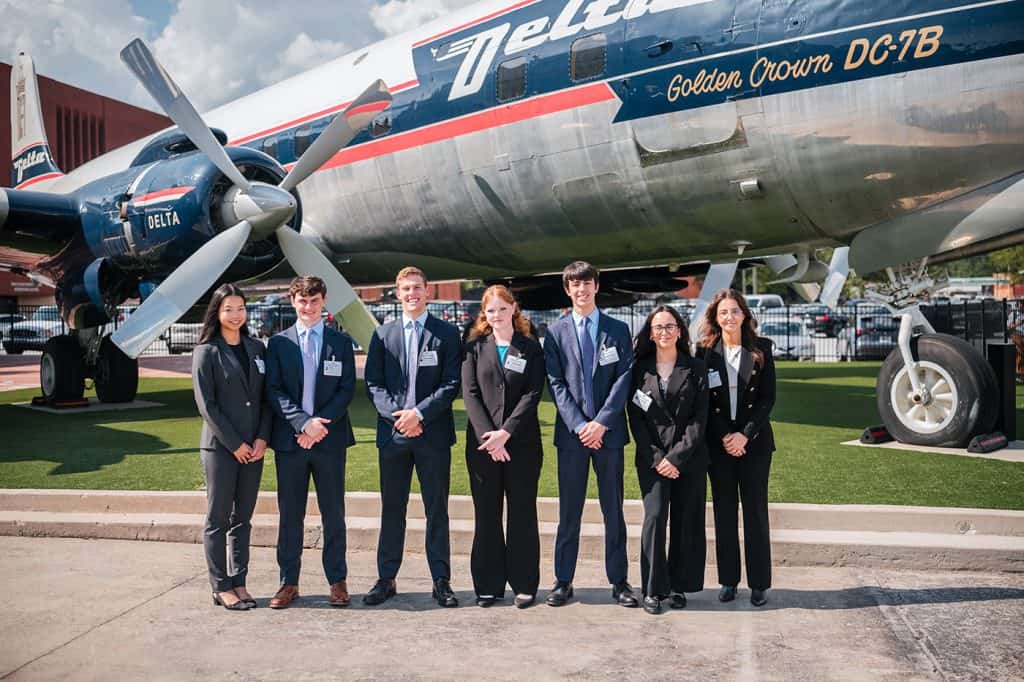
Can you share a bit about your recent partnership with Delta Air Lines? What was your project focus?
We were asked to explore ways Delta could better engage their customers around sustainability. Rather than simply offering ideas, we aimed to create a concrete, actionable solution that could align with Delta’s existing customer engagement strategy. The result was a conceptual loyalty framework designed to reward and encourage more sustainable travel behaviors, inspired by the structure of Delta’s current loyalty programs.
What have been some of the biggest challenges and learning experiences for your team?
One of the initial challenges of the project was the broad nature of the prompt, which required us to define the scope of our deliverable with limited guidance. As we explored the intersection of sustainability and the airline industry, it quickly became clear that any recommendations needed to align with the business realities of a low-margin industry. We focused on identifying solutions that could meaningfully reduce environmental impact while supporting competitive advantage and financial viability.
Our most compelling idea integrated customer engagement with climate action, offering Delta a unique opportunity to lead in sustainable aviation while expanding its market share. Navigating a complex, carbon-intensive industry helped us better understand the tension between long-term climate goals and near-term business constraints. At its core, sustainability is about using fewer resources and less energy, lowering costs, and appealing to a growing base of consumers who now see environmental responsibility as a prerequisite for choosing a company’s products or services.
Additionally, many of our consultants, who were engaging in this type of work for the first time, sharpened their presentation skills and gained invaluable experience presenting in a high-stakes setting. Our team delivered its final presentation to Delta’s Chief Sustainability Officer, along with members of the sustainability and loyalty teams, at Delta’s headquarters in Atlanta.
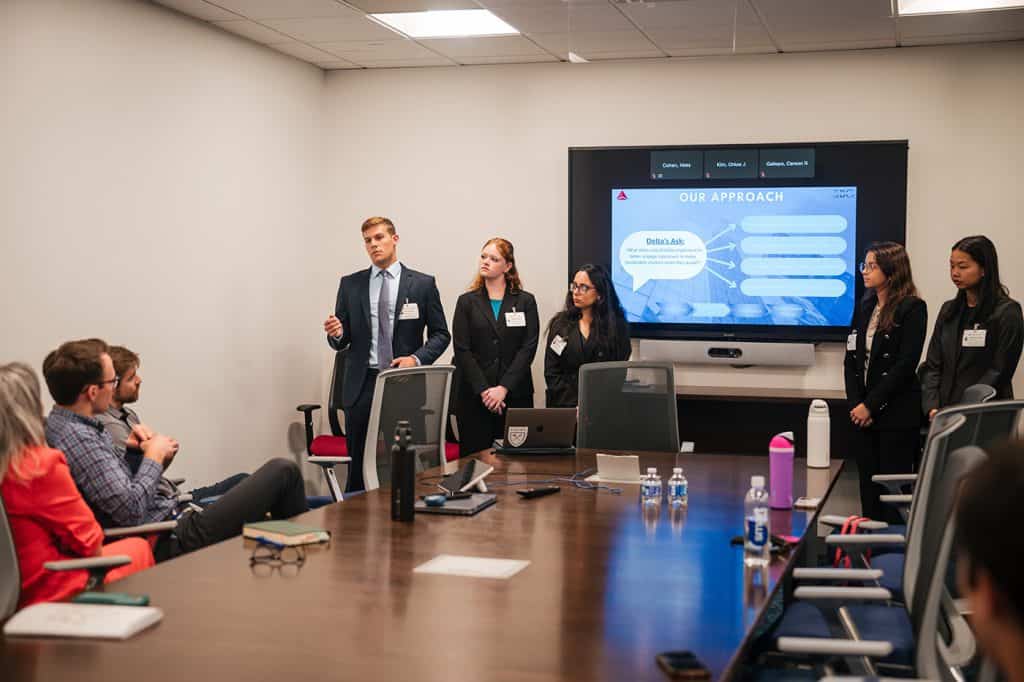
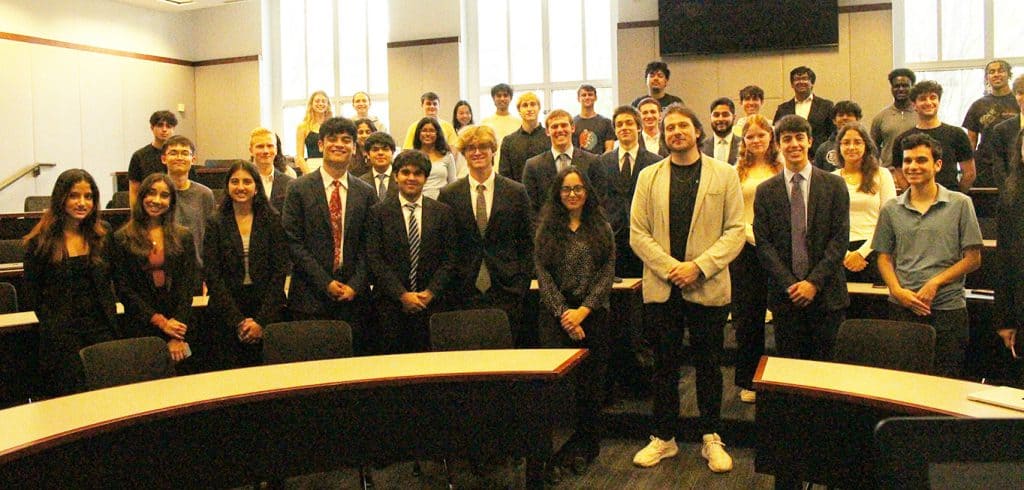
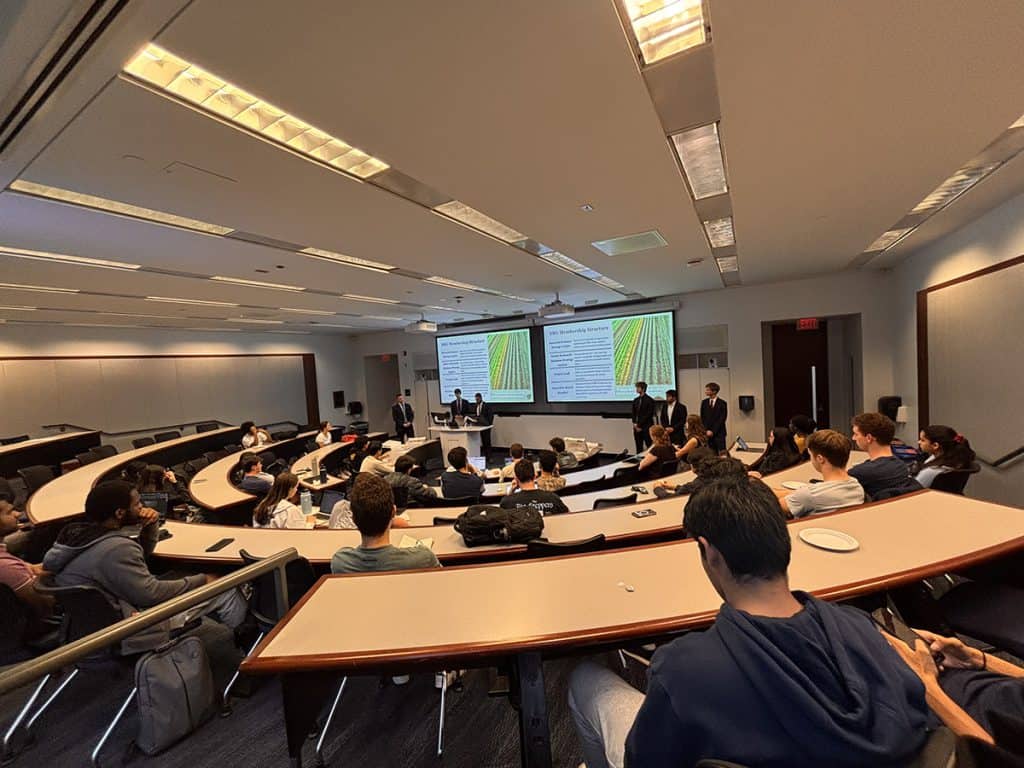
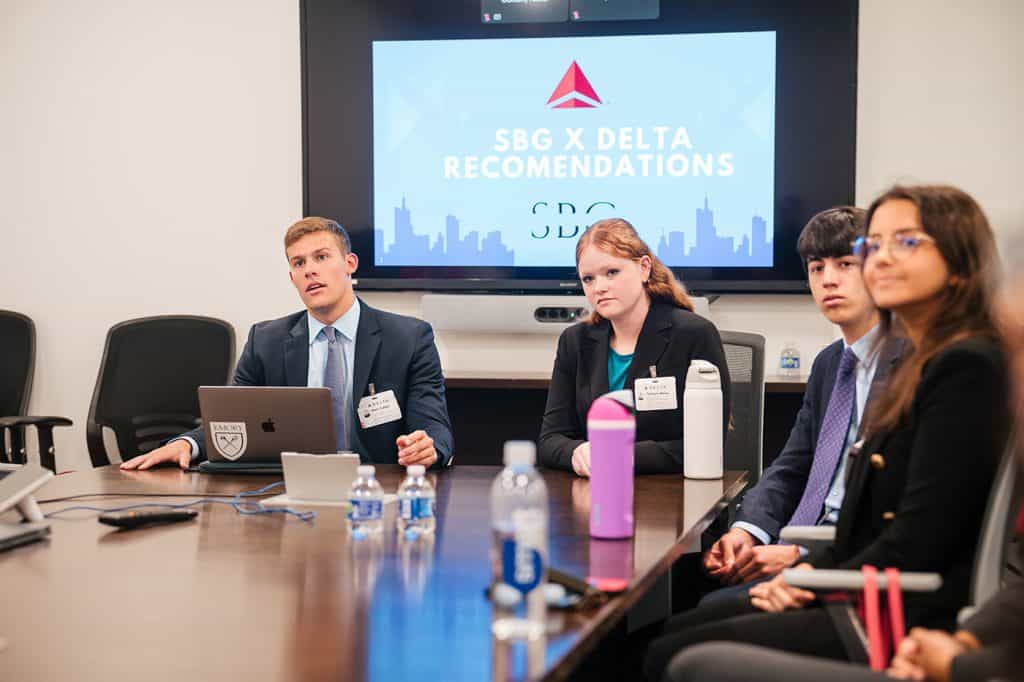
How do you see sustainability and business intersecting in meaningful ways, especially for students at Emory?
I believe that having a specific interest, something you can genuinely talk about, can benefit Emory students greatly. In the hyper-competitive climate of recruiting, students applying for general consulting or investment banking roles often struggle to stand out. I’ve found that by targeting people in a specific industry, such as companies working in the energy transition, they’re much more likely to be open to helping you out. Additionally, sustainability-minded individuals are everywhere, whether it’s in supply chain logistics, energy markets, finance, real estate, or literally any other industry. For whatever reason, I’ve found they’re often more willing to connect you with someone who can help or offer authentic advice because they were once in your shoes. I’m not sure SBG would have landed a project with Delta if we had been offering just general consulting services. Every undergrad consulting club across the country can offer that. We’re targeting a niche to get inside these big companies. Students can do the same.
What advice would you give to other students looking to get involved in sustainability or consulting work while in school?
All it takes is a little initiative. At Emory, the Sustainable Business Group is open to all students in both the Business School and the College. While students must be selected to work on client-facing projects, we offer additional resources open to everyone. These include career development workshops focused on resume building, presentation skills, public speaking, and consulting preparation, as well as a speaker series that allows all students to network with professionals doing meaningful work in sustainability. By engaging in these resources, students can start their journey preparing for the workforce, getting real world experience, and learning about different roles in the sustainability space. I believe that once you get involved, everything snowballs from there.
What’s next for the group—any exciting projects, partnerships, or goals on the horizon?
We’re excited to share that four of our consultants at SBG will be continuing their work with our client XCharge this summer through the company’s internship program. XCharge was not only impressed by the work SBG delivered this semester, but also chose to bring back the consultants who stood out to continue contributing to their team. Not many clubs on campus can say their client engagements led directly to internships, so we’re especially proud of our consultants’ hard work that led to this outcome. It’s something we hope to continue and expand across our other clients to help even more SBG members advance their careers and job search process.
Despite all the progress we made this semester, we’re not done growing or expanding. We plan to work with more Fortune 500 companies, as well as smaller startups and nonprofits in the sustainability space next year. This semester, only a fourth of our applicants had the opportunity to work on projects with real clients, so one of our goals is to take on more projects to give more students that valuable, hands-on experience.
We’re also in the process of turning Emory SBG into a national organization. We’re launching a new chapter next semester and are actively working to expand to additional campuses across the country. We’re incredibly excited about this next phase of growth and are also exploring ways to secure additional funding to support SBG’s outreach and long-term sustainability.
